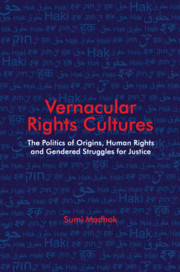 Vernacular Rights Cultures
Vernacular Rights Cultures Book contents
- Frontmatter
- Dedication
- Contents
- Acknowledgements
- 1 An Introduction: Vernacular Rights Cultures and Decolonising Human Rights
- 2 Refusing the Politics of Origins
- 3 Assembling a Feminist Historical Ontology of Haq
- 4 The Political Imaginaries of Haq: ‘Citizenship’ and ‘Truth’
- 5 Resisting Developmentalism and the Military: Haq as a Cosmological Idea and an Islamic Ideal
- 6 Conceptual Diversity, Feminist Historical Ontology and a Critical Reflexive Politics of Location
- References
- Index
5 - Resisting Developmentalism and the Military: Haq as a Cosmological Idea and an Islamic Ideal
Published online by Cambridge University Press: 31 July 2021
- Frontmatter
- Dedication
- Contents
- Acknowledgements
- 1 An Introduction: Vernacular Rights Cultures and Decolonising Human Rights
- 2 Refusing the Politics of Origins
- 3 Assembling a Feminist Historical Ontology of Haq
- 4 The Political Imaginaries of Haq: ‘Citizenship’ and ‘Truth’
- 5 Resisting Developmentalism and the Military: Haq as a Cosmological Idea and an Islamic Ideal
- 6 Conceptual Diversity, Feminist Historical Ontology and a Critical Reflexive Politics of Location
- References
- Index
Summary
In May 2012, Napi Bai, the Adivasi sarpanch of Medi Panchayat in kotra Block of Udaipur, organised a gram sabha to pass a ‘no-confidence’ motion against a development project intent on expanding the boundaries of a wildlife sanctuary. Kotra is the Adivasi block of Udaipur district and nearly 96 per cent of its population (GOI 2011b) belongs to India's Indigenous or Adivasi communities. It nests in the Southern Aravalli hills where the Wakal river flows through. The Adivasi block is also part of southern Rajasthan's ‘hunger belt’. Kotra is where India's pre-eminent news magazine Frontline reported 47 hunger deaths in 2001 (Mishra 2001). Hunger continues to haunt Kotra while bureaucratic apathy and death by starvation continue to be a persistent presence.
For nearly four decades, the Adivasi peoples of Kotra have been resisting the steady bureaucratic inroads that Phulwari Ki Naal, the wildlife sanctuary which was declared as such in 1983, has been making into their life-worlds by gradually swallowing up their ancestral lands, forests, streams and villages and forcing them to live under the uncertainty and terror of being dispossessed from their lands. Today, the Phulwari Ki Naal wildlife sanctuary covers a total area of 511.41 square kilometres out of which 365.92 square kilometres is designated as ‘Reserved Forest’ and encompasses 134 villages in the area (Forest Department Rajasthan 2014: 3). The event, however, that precipitated the passage of the ‘no-confidence’ motion in the gram sabha on that fateful day was the proposed extension of the wildlife sanctuary into two villages in the Panchayat. If the extension plans for the sanctuaryu were to go ahead, then in effect, this would mean the displacement and relocation of these two villages along with its people, cattle and livestock elsewhere. But where was this elsewhere? No one quite knew to where the villages would be relocated.
The word going around in the Panchayat was that this elsewhere would be somewhere in Jaisalmer. Those who are familiar with the topography of Rajasthan would know that Jaisalmer is the desert district of Rajasthan and it could not be more in contrast with the lush hills and forests of Kotra. This dread of displacement is hardly an abstract one. While official figures admit that between 1951 and 1990, 21.5 million people in India have been displaced from their lands as a result of development projects, scholars however, have put the figures of displaced populations at three times higher, at 60 million (Fernandes 2007).
- Type
- Chapter
- Information
- Vernacular Rights CulturesThe Politics of Origins, Human Rights, and Gendered Struggles for Justice, pp. 144 - 172Publisher: Cambridge University PressPrint publication year: 2021


